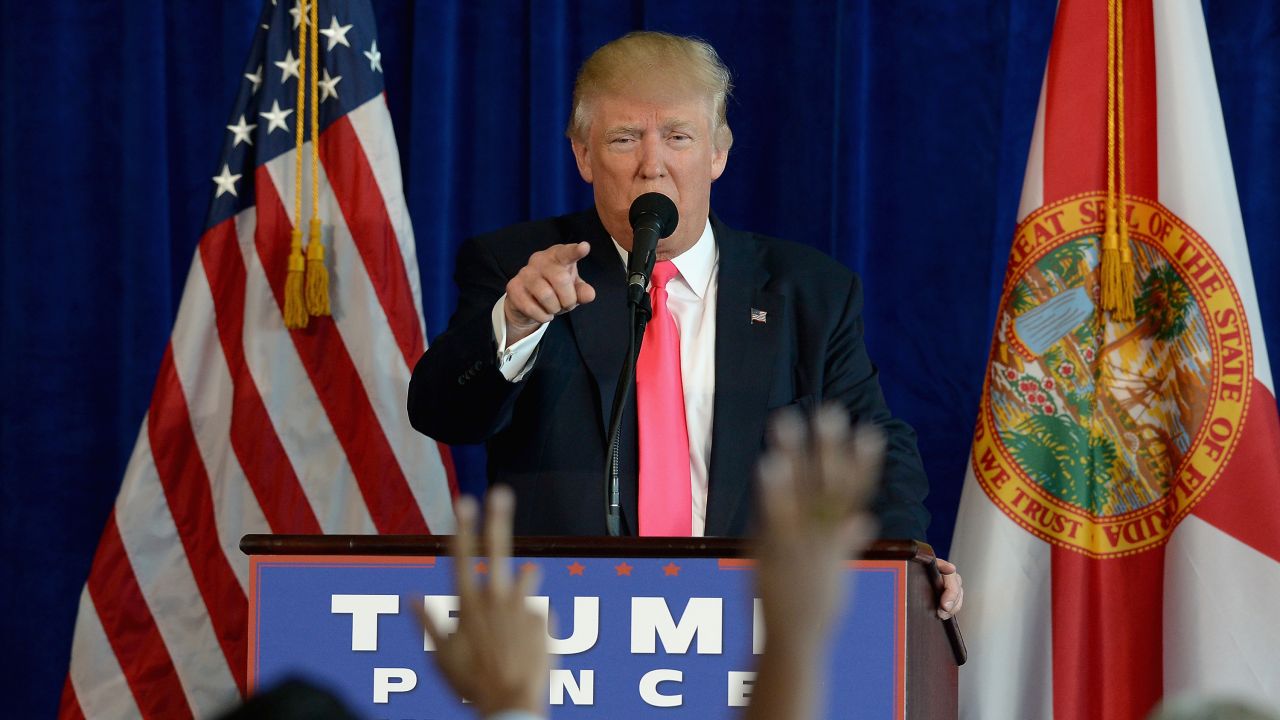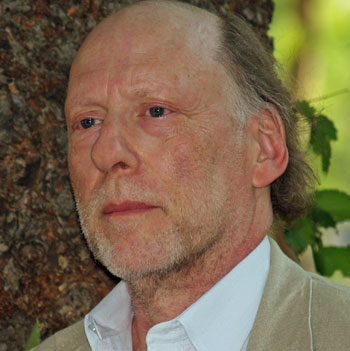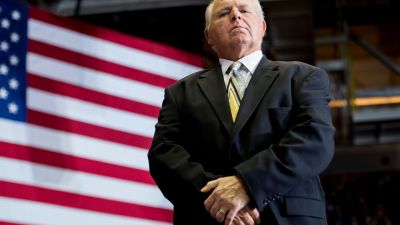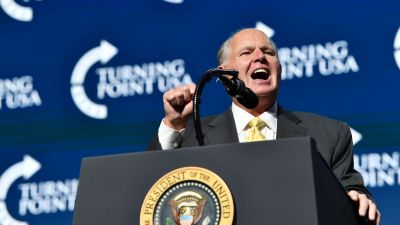
Republican presidential nominee Donald Trump holds a press conference at Trump National Doral on July 27, 2016 in Doral, Florida. Trump spoke about the Democratic Convention and called on Russia to find Hillary Clinton's deleted emails. (Photo by Gustavo Caballero/Getty Images)
Donald Trump owes his notoriety first to a cultivated symbiosis with New York’s tabloids in the ‘80s (a trick he learned from his mentor, Joseph McCarthy sidekick Roy Cohn) and second to his mastery of reality show spectaculars from 2004 on.
So he has an idea of the place of media in a democracy. In fact, he has two ideas, though in the end he thinks they add up to one: The media ought to keep people diverted and they ought to channel him. For life is a beauty contest, and he is the biggest and most beautiful of the beautiful.
Everyone gains, he thinks, when the media serve as machines of flattery. They exist to compensate people for what they lack in their own lives by giving them a taste of the gold-plated, swashbuckling, debt-cancelling, worker-firing, enemy-blasting, serial-marrying life they wish they had.
The basis of his complaints about media, then, is that in betraying him they betray their essential purpose, which is to attract eyeballs and eardrums. The television networks, Trump thinks, ought to run his rallies not only from start to finish, but from before they start until after they finish. They ought to let the entitled Leader call in to talk shows when he likes. If they want to interview him, they ought to make pilgrimages to Trump Tower.
It’s old news, but worth reviewing, that by one careful calculation, Trump received, through February alone, the equivalent of some $2 billion worth of free media on television — more than all other candidates in both parties put together. For Trump is a master of cashing in free benefits — benefits, that is, from city governments, state governments and foreign governments that subsidize him with tax abatements and corner-cutting maneuvers beyond number.
So it’s interesting to watch Donald Trump go splenetic about the press. They’re “failures.” They’re “sleazy.” They put forth “so many lies.” They issue “glowing reports” on Hillary Clinton. They fail to accord due respect to the National Enquirer. Trump’s tweets thump the press as regularly as he repeats himself:
Funny how the failing @nytimes is pushing Dems narrative that Russia is working for me because Putin said “Trump is a genius.” America 1st!
— Donald J. Trump (@realDonaldTrump) July 27, 2016
Another:
No matter what Bill Clinton says and no matter how well he says it, the phony media will exclaim it to be incredible. Highly overrated!
— Donald J. Trump (@realDonaldTrump) July 27, 2016
In the view from Trump Tower, Trump paid for the microphone — the only microphone anyone needs. Interruptions need not apply, for he is entitled to rattle off phrases — his usual substitute for actual sentences — without having to suffer follow-ups or requests for evidence. If the press barks at him, all the better — he gets to hit back 10 times harder.
So it’s not altogether surprising that his press conferences, most recently Wednesday’s in Doral, Florida, fail to follow conventional practice when it comes to permitting reporters to be heard by the viewing audience. They’re wholly inaudible. Out where the reporters are gathered when he summons them, there are no microphones or stands, no directional microphones, nothing. What’s meant to be heard are the answers, not the questions. Viewers are not able to judge whether the question was answered or not. Trump, the alpha of all alpha males, wants reporters to know what their place is. They’re omegas, whether female or male. They ought to be grateful to be admitted to his presence at all.
Nothing exactly new here. He has a tradition. Disgust with the “lamestream media,” that loathsome apparatus of unelected and overeducated elites, has been endemic since the Goldwater campaign of 1964. Then, in turn, came the broadsides against network television directed by the Moral Majority and its ilk. The first organizational expression of this shotgun approach to the “liberal media” was Accuracy in Media, founded by the McCarthyite Reed Irvine in 1969, when the Nixon administration had unleashed its polysyllabic, William-Safire-scripted attack dog Spiro T. Agnew to snarl at black militants, New Leftists, hippies and other such riffraff.
During the Reagan years, Irvine was zealous in his smears of The New York Times’ Raymond Bonner, who exposed the slaughter of hundreds of villagers perpetrated by American-trained special forces in El Salvador. There’s a straight line from such old-fashioned smears to the more mirthful smirks of Rush Limbaugh and his epigones in the ‘90s, who, in turn, prefigured the Trump style of demagoguery with such coinages as “feminazi.” Cries of “Vince Foster” prefigured those of “Benghazi.” Death panels twined with birth certificates.
Enter Trump reducing the propagandistic barks of the Rupert Murdoch-Roger Ailes Fox News to 140 characters. Trump mans the artillery set out for him by Sean Hannity, Bill O’Reilly, Glenn Beck, Alex Jones, Michelle Malkin and, among many wannabes, the recently honored talk radio heroine Laura Ingraham, whose July 20 Republican Convention snarl at the press proved the biggest applause line of the night. “To all my friends up there in the press,” she said, “you all know why in your heart Donald Trump won the Republican nomination. You know it. You know why he won it? Because he dared to call out the phonies, the frauds and the corruption that has gone unexposed and uncovered for too long. Do your job,” she told reporters. “Doing your job is a novel concept.”
The right’s fury at the mainstream is, if anything, more furious than the far left’s, though they share a like propensity to think that if only the media stopped distorting their righteous points of view, scales would fall from America’s eyes and the country’s politics would readily turn out more to their liking. Perhaps the right feels more entitled than the left. In any event, Trump’s hope is that his potential voters, soaked in talk radio and Fox News for years, hate the media more than they hate him. He’s probably not right about a political majority, but we’ll see.
Now, everyone who writes about media and has a political point of view knows the temptation to think that the world would boogie along on the proper track were it not for the liberal (or bourgeois) media — what President George W. Bush called “the filter” that interfered with his manly transmissions. (“Somehow you just got to go over the heads of the filter and speak directly to the American people,” Bush said in 2003.)
The left-wing version of this paranoid streak imputes the enemy’s omnipotence to the legions of bought-and-paid-for hacks who carry water for them. The prime mover here is the linguist Noam Chomsky, who has long accused the mainstream press of ganging up on left-wing revolutions. While often perceptive about Vietnam, Chomsky hastened overboard once he had concluded that America is the root cause of all major war crimes everywhere. With a collaborator, Edward Herman, he trivialized the crimes of the Khmer Rouge and smeared the work of the first Western writer to expose their genocide, Francois Ponchaud. In a vastly overrated but influential book, again co-authored with Herman, Chomsky adopted a mechanical “propaganda model” of American media as a mechanical product of the American ruling class. In this model, there is no room to take account of The Times’ Bonner or, indeed, many other mainstream reporters whom Chomsky, when collecting his clips for footnotes, likes to cite when he approves of what they write.
One has to hand one thing to Chomsky and Herman, however. They are evidence-impaired but coherent — as coherent as a syllogism that always already knows the truth before inconvenient facts arrive. For them it’s ideological, not personal. For Trump, it’s always personal. For free, I suggest a title for his next book, perhaps to be co-authored with Ingraham or Ann Coulter: The Art of Suppressing the Truth about Me.




